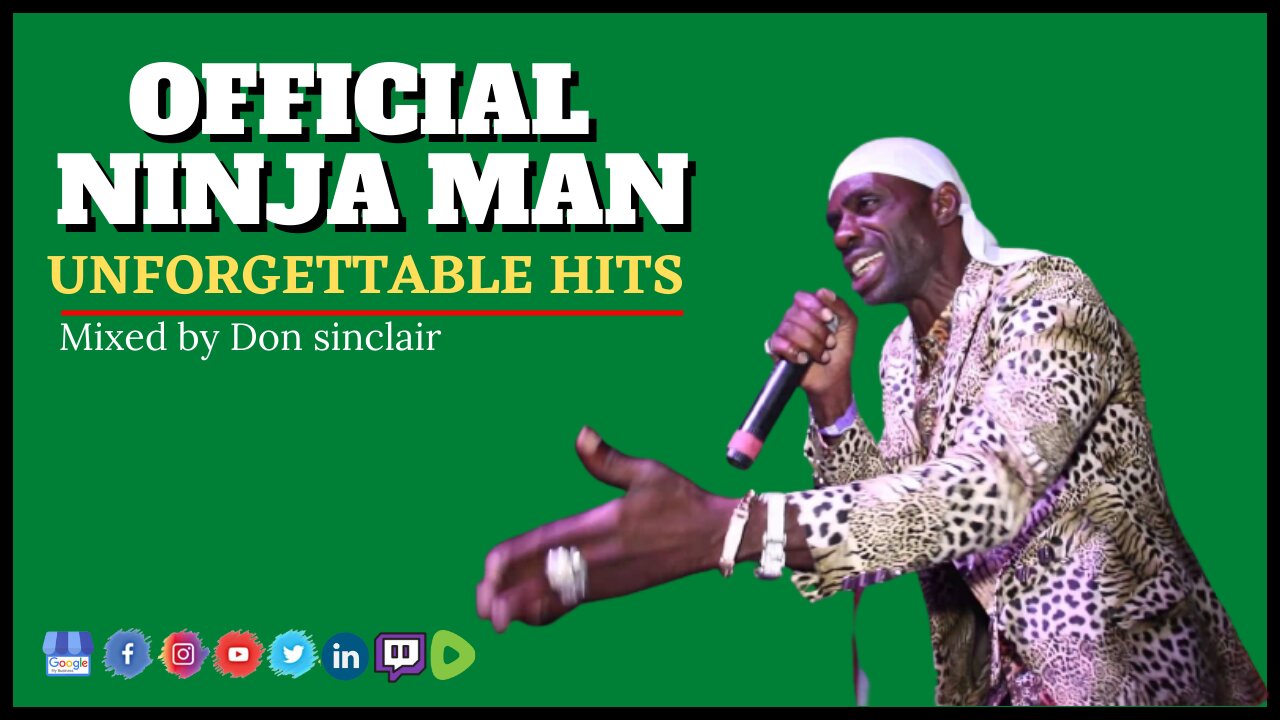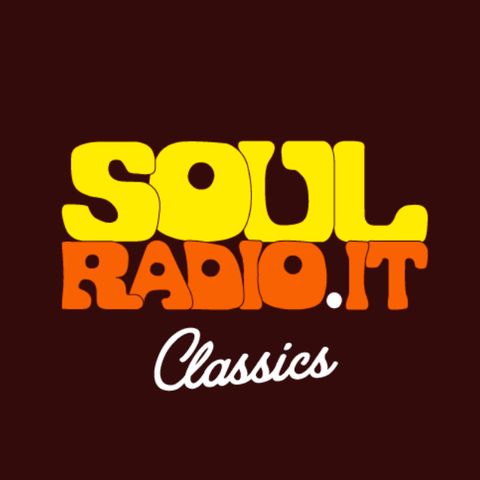Official Ninja Man Unforgettable HITS
Ninjaman, alias Don Gorgon, (born Desmond John Ballentine on January 20, 1966, in Annotto Bay, Jamaica) is a popular dancehall deejay and actor, known for his controversial and pro-gun lyrics and his stuttering and melodramatic style. Ninjaman is currently out on bail awaiting trial for a murder that was committed in Kingston, Jamaica.
After moving from his birthplace Annotto Bay to Kingston at the age of 12, he launched his deejay career with the Black Culture Sound System at age 12 as "Double Ugly".
In 1980, he joined Killamanjaro, there got the chance to learn from established deejays Super Cat and Early B, and released his debut single as "Uglyman". Yet another name change made him the now well known Ninjaman. In 1987, Ninjaman recorded - and produced himself - his first hit single "Protection", a duet with Courtney Melody. The following years brought many prolific collaborations with producers like King Jammy, Witty, Xterminator, Philip "Fatis" Burrell, Redman, Ini Kamoze, Bobby Digital, Augustus "Gussie" Clarke, and Steely & Clevie and Henry "Junjo" Lawes. It has been said that Ninjaman comes up with all of his lyrics on the spot in the recording studio, in a freestyle manner.
His hits over the years 1989-1992, like "Murder Dem", "Permit to Bury" and "Above the Law" reinforced Ninjaman's image of a violent rude boy. One of his most infamous rivalries (besides the ongoing quarrels with Flourgon and Super Cat) was the one with Shabba Ranks, leading to a number of clashes.
In 1993, criticism of Ninjaman's violent and pro-gun lyrics arose, leading to a decline in performing gigs and chances to record.
By 1997, Ninjaman had changed his name once again, now performing gospel reggae songs as "Brother Desmond".
❤️💛💚
Uk's Leading Broadcast Station for more Quality Vibes Subscribe to our NEW Platform at Rumble. com for all our latest videos.
(((( █▬█ █ ▀█▀ Subscribe, █▬█ █ ▀█▀ Like & Comment ))))
https://rumble.com/v2bzriq-off....icial-ninja-man-unfo
Discover posts
Explore captivating content and diverse perspectives on our Discover page. Uncover fresh ideas and engage in meaningful conversations
Reggae Royalty Foundation Essentials: Dennis Brown Freddie Mcgregor & Cocoa Tea [MUSIC MIX]
Dennis Emmanuel Brown CD (1 February 1957 – 1 July 1999) was a Jamaican reggae singer. During his prolific career, which began in the late 1960s when he was aged eleven, he recorded more than 75 albums and was one of the major stars of lovers rock, a subgenre of reggae. Bob Marley cited Brown as his favourite singer, dubbing him "The Crown Prince of Reggae", and Brown would prove influential on future generations of reggae singers.
Dennis Brown was born on 1 February 1957 at Jubilee Hospital in Kingston, Jamaica. His father Arthur was a scriptwriter, actor, and journalist, and he grew up in a large tenement yard between North Street and King Street in Kingston with his parents, three elder brothers and a sister, although his mother died in the 1960s.
He began his singing career at the age of nine, while still at junior school, with an end-of-term concert the first time he performed in public, although he had been keen on music from an even earlier age, and as a youngster was a keen fan of American balladeers such as Brook Benton, Sam Cooke, Frank Sinatra, and Dean Martin. He cited Nat King Cole as one of his greatest early influences.
Freddie McGregor is one of reggae's most durable and soulful singers, with an incredibly steady career that started all the way back in the '60s when he was just seven years old. Since then, he's spanned nearly every stylistic shift in Jamaican music, from ska and rocksteady to Rastafarian roots reggae to lovers rock (his particular speciality) to dabbling in dancehall, ragga, and dub. Not just a singer, he wrote some of his own material and grew into an accomplished producer as well. McGregor's heyday was the early '80s when he released high-quality albums like Big Ship and reached the peak of his popularity in Jamaica and England. However, he remained an active presence on the reggae scene for decades to come, producing for other artists, and sporadically sharing new music of his own with releases like 2013's Di Captain and 2016's True to My Roots.
McGregor was born in Clarendon, Jamaica on June 27, 1956. At age seven, he started singing backup for a local ska harmony duo called the Clarendonians (naturally, with the nickname of Little Freddie McGregor). The Clarendonians recorded for producer Clement "Coxsone" Dodd's legendary Studio One label for a time, and when they split in the mid-'60s, McGregor teamed up with ex-member Ernest "Fitzroy" Wilson to form a new duo, Freddie and Fitzroy.
Cocoa Tea was one of the few early dancehall stars to carve out a consistent, productive career as the genre evolved over the years. His cool-toned, laid-back vocals were perfect for sweet, smooth lovers' rock, and gave him a distinct identity amid his more aggressive peers. Still, he was also capable of toughening up his sound on his cultural protest material, which was often sharply perceptive. Tea was born Calvin Scott on September 3, 1959, in Rocky Point, a small town in Jamaica's Clarendon parish. He sang in his church and school choirs as a youth, and made his first recordings for producer Willie Francis in 1974 at the mere age of 14; one single, "Searching in the Hills," was released under his given name, but went nowhere. He spent the next few years working as a racehorse jockey, then as a fisherman; during the latter occupation, he began to rediscover his musical ambitions, performing with the travelling sound systems that passed through local dancehalls.
Weh Dem a Go Do...Can't Stop Cocoa Tea
In 1983, he moved to Kingston and adopted the performing name Cocoa Tea, after the Jamaican term for hot chocolate (later alternate spellings would include Coco Tea and Coco T). He soon met top dancehall producer Henry "Junjo" Lawes, and recorded a series of hit singles that included "Rocking Dolly," "I Lost My Sonia," "Informer," and "Can't Stop Cocoa Tea." His first album, Weh Dem a Go Do...Can't Stop Coco Tea, was released in 1985 and compiled many of his previous successes (a slightly different version, Rocking Dolly, was later issued in the U.S.).
❤️💛💚
Uk's Leading Broadcast Station for more Quality Vibes Subscribe to our NEW Platform at Rumble. com for all our latest videos.
(((( █▬█ █ ▀█▀ Subscribe, █▬█ █ ▀█▀ Like & Comment ))))
https://rumble.com/v2c28zg-reg....gae-royalty-foundati
Radio Italiane is an app that lets you listen to the best of Italian music from your smartphone or tablet device. It also allows you to share your favorite stations with friends via email, Twitter or Facebook. It is a free and easy to use application for all users.
https://ascolta-radio.it/
Easy Book Alaska Airlines flights on " Cheapinair ". Explore our best Alaska Airlines reservation deals and select a flight for your next travel Or call our experienced travel agents for Alaska Airlines Flight Booking. Call Us for the Lowest Airfares at 1-800-938-0648. #travellover @ https://www.cheapinair.com/fli....ghts/alaska-airlines








![Reggae Royalty Foundation Essentials: Dennis Brown, Freddie Mcgregor & Cocoa Tea [MUSIC MIX]](https://reggaefalls.s3.amazonaws.com/upload/photos/2023/03/CI1HhMcgnm2kfVnj6GDx_url_image.jpg)




